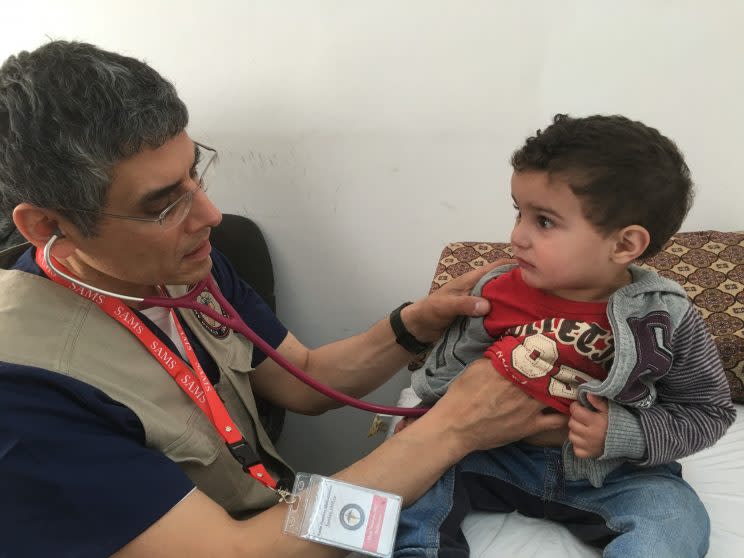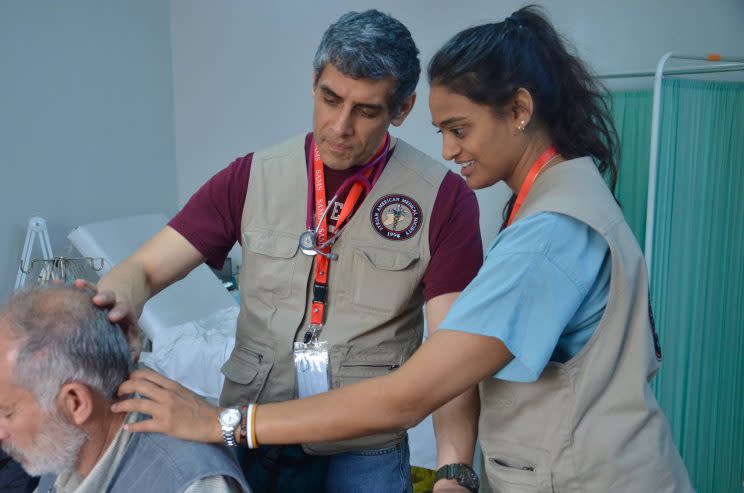‘They had no other options’: U.S. doctors to treat Syrian refugees in Jordan

The Syrian American Medical Society (SAMS) is planning a six-day mission for American doctors to care for refugees in camps and ghettos in Jordan.
Jihad Shoshara, a 47-year-old pediatrician who was born and raised in Chicago and studied at the University of Chicago, is organizing the mission, which will send medical personnel on April 8 to the area around Amman, the country’s capital and the most populous city.
SAMS is the major nongovernmental organization within the United States, helping to care for Syrian refugees through missions with volunteers from throughout the United States and other countries. There will be nearly 70 volunteers for this trip, including pediatricians, doctors of internal medicine, orthopedic and plastic surgeons, dentists and translators. It will be the second trip that Shoshara has led.
“Basically, it’s meant to bring expertise to help care for the refugees,” Shoshara told Yahoo News. “They are refugees because they had no other options. And they’re not looking for anything beyond their own safety and trying to make themselves whole.”
The United Nations High Commissioner for Refugees has registered 650,000 official refugees from Syria living in Jordan. That’s roughly 10 percent of Jordan’s total population.
According to Amnesty International, 93 percent of Syrian refugees in Jordanian urban areas are living in poverty. More than 4.8 million of the refugees are concentrated in just five countries: Turkey, Lebanon, Jordan, Iraq and Egypt.

“Refugees in most countries around Syria don’t have access to regular support systems. They don’t have access to health care or legal work, and their kids don’t have access to the education system. So they’re really stuck,” Shoshara continued. “For most of the patients, the care that we’re going to be bringing will be the one to two times that they’ll actually interact with a doctor.”
Syria is the epicenter of the largest worldwide refugee crisis of our time. The European University Institute estimates that 11 million Syrians have fled their homes since the onset of the Syrian civil war in March 2011.
Shoshara has seen the effect of the Syrian civil war on his own family. His mother was born and raised in the United States, but his father is originally from Damascus, the capital city in southwestern Syria. He had seven aunts and uncles living in Damascus before the war started. He has 45 first cousins on his father’s side alone. Shoshara also lived in Damascus briefly during college, and last traveled there in 2009 to visit his family.
“When the war came, the family got shattered. It splintered. Everyone has 14 relatives who are now refugees in Europe,” he said.
Just last year, Shoshara said, some of his relatives used boats to cross from Turkey to Greece and walked across Eastern Europe.
He became involved with the medical missions two years ago, when SAMS organized its first trip to Jordan. He was asked to help organize the mission the following year.
Shoshara was interested in correcting several misconceptions about the refugee crisis. He said that it is unfortunate the refugees’ plight has been politicized and that they are often only considered in the West in terms of national security. He said the refugees would love to return to Syria tomorrow if it were safe.

“Nobody wants to be a refugee. Nobody in Syria wanted to leave. It was their home country. Nobody wants to leave their home. All my relatives, they never wanted to leave. They left because they were worried they were going to be killed.”
By November 2016, only 56 percent of the United Nations’ humanitarian appeal for Syrian refugees for the year was funded. Within Syria, 13.5 million people need assistance, 6.3 million are internally displaced and 4.9 million are surrounded and hard to reach, according to the humanitarian agency CARE.
Millions of Syrian children are growing up in squalor without proper nutrition and education. Shoshara said he’s seen countless malnourished children who bear both physical and psychological scars. He characterized them as “a lost generation” and said that this could become a broader problem for the international community if they are simply cast aside and forgotten in refugee camps.
The volunteers will be based in a hotel and will pay their own way. Some doctors will enter crowded waiting rooms and see patient after patient, who have been “prescreened to a certain degree,” until the day is over. This could result in up to 80 visits per doctor a day in urban areas or 20 per doctor in remote areas. Either way, the doctors are preparing for six busy clinical days using basic medicine.
Shoshara said the doctors usually leave with a renewed appreciation for how fortunate they are to live in the United States, thinking about how they can best serve those less fortunate.
“All these doctors have come to give their time. Everyone is going to go there and exhaust themselves,” he said. “You can take all the doctors in America, and we’re not going to solve the underlying problem that’s causing the Syrian refugee crisis.”
Read more from Yahoo News:


